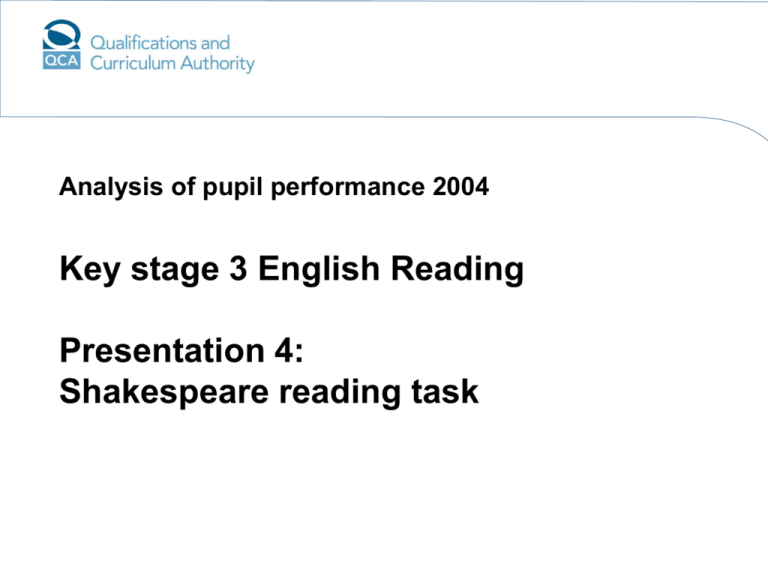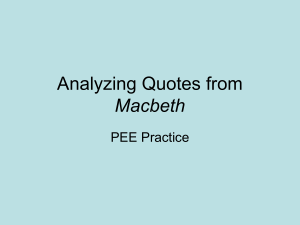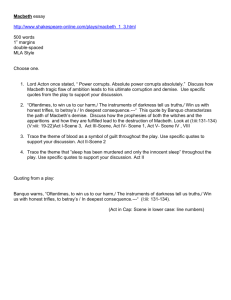Reading presentation 4
advertisement

Analysis of pupil performance 2004 Key stage 3 English Reading Presentation 4: Shakespeare reading task Aims of the session the criteria for the Shakespeare analysis the implications for teaching and learning for each level • examples from pupils’ answers. Shakespeare reading tasks Prepared reading AFs not discretely assessed Four areas for assessment identified Each task foregrounds one of these. 18 Marks Areas targeted for assessment this year: Henry V – text in performance Macbeth – ideas, themes and issues Twelfth Night – character and motivation. Implications for teaching and learning Drawn from analysis of sample of 378 scripts across all 4 levels. Sample selected to exemplify mark ranges across levels and equal mixture of boys and girls. Analysis Scripts analysed according to a set of criteria loosely based on the mark scheme - understanding of what characters say and do and their motives; main ideas in scenes in relation to development of the drama, and as relevant to the focus of the task - understanding of the ability to explain the effects of the language in relation to the drama, and as relevant to the focus of the task. - use of quotation and direct textual reference. Implication for teaching and learning for levels 4 to 5 – Character Mean marks L4 3.2 L5 5.3 Help pupils to: Select and focus on key actions and motives for comment. Example 1 from a 1-mark answer ...After Macbeth goes and gets a murder weapon, gears himself up and goes into Duncan’s room and…KILLSHIM. Macbeth grabs the weapon still dripping with blood, runs as far away as possible and slips the murder weapon into one of the murders hand so it looks like the murders have killed Duncan… Recounts part of the story and part which is not included in the extract on the test paper Example 2 from a 3-mark answer It is difficult to know who to trust. Macbeth Doesn’t trust Banquo and Banquo does not trust Macbeth. Now Macbeth has become Thane of Cawdor as well as Glamis, he thinks the world of himself, and Banquo hates him for it. But Macbeth knows this so he has planned to kill Banquo. I wouldn’t trust Macbeth as my friend if he was planning to kill people… Attempts to address the task set, comments general and not supported by textual reference. Implications teaching and learning for Levels 4 to 5 – Language Help pupils to: • Identify ways in which the language conveys aspects of character, mood and atmosphere. Example 3 from a 4-mark answer …Banquo still thinks he would be the father of many kings, I can say that because in this extract Banquo says “But that myself should be the root and father of many kings”. Banquo doesn’t trust Macbeth at all now, because he clearly suspects murder, he says it, ‘and I fear, though playedst most foully for it”……... Closer engagement with the language here. Implications for teaching and learning for levels 4 to 5 – References Help pupils to: • Select brief, relevant quotations to support and develop points. Example 4 from a 1-mark answer Act 1 Scene 3 Line 142 Banquo: look how our partners rapt Line 153 and 154 Macbeth: let us speak from our hearts to each other. Line 158 Macbeth: Give me favour my dull brain was wrought with things forgotten…… As you are maybe able to tell from the text Banquo does not totally trust Macbeth. Macbeth tries to lead him into his trust with a lie yet Banquo does not fall for it. Quotations with no comment at all. Example 5 from a 2-mark answer ...In these extracts I don’t think Malvolio deserves sympathy because he treats everybody badly and thinks he is the one. He thinks he does nothing wrong at all and doesn’t like the way other people are. In the story he says things like Have you no mannors, nor honesty but to gabble like tinkers. So he thinks very high of himself. Is there no respect of place, persons, nor time in you; that’s saying he is very strict and the others have to be in the house early… Includes some direct reference here and attempts to comment on it. Example 6 from a 7-mark answer ...Macbeth doesn’t trust Banquo: “our fears stick deep”, “’Tis much he dares, and to that dauntless temper of his mind,” and “there is none but he, whose being I do fear;” these all suggest that Macbeth fears Banquo and doe’snt feel safe with him around because of his sons becoming king…. Signals focus at sentence opening, brings in three supportive, brief quotations, and then explores Macbeth’s fears. Example 7 from a 6-mark answer I think Malvolio doesn’t need our sympathy in the extracts because in Act 2 Scene 3 he is very aggressive to Sir Toby and the others. He is very rude because he comes all of a sudden and does not say anything but starts to shout straight away example he said ‘My masters are you mad? That is very rude he comes and says that he also says ‘Have you no wit, manners, nor honesty but to gable like tinkers at this time of night? Here he trying to say you don’t have any manner or honesty and also it’s late in the night as well… Implications for teaching and learning for Levels 5 to 6 – Characters Mean marks L5 5.3 L6 8.6 Help pupils to: Relate characters’ speech and actions clearly to ideas and themes, eg honour, loyalty, trust, sympathy. Example 7 from a 6-mark answer Angus and Ross told Macbeth about Being thane of Cawdor And Macbeth and Banquo don’t Believe them ‘What can the devil speak true”. Macbeth questions it ‘Why do you dress me in borrowed ropes’. Macbeth starts not to trust Banquo and asks him ‘Do you not hope your children shall be kings’. Macbeth start to think wether it is a good or BAD thing and he’s starting to worry about what the 3 witches said to Banquo about his sons and he’s starting not to trust him. Addresses the key idea and stays close to the text. Example 8 from an 8-mark answer I think Malvolio does and does not need sympathy in these extracts. This is because Malvolio is very mean to Sir Toby, Feste and Maria and Sir Andrew. Malvolio thinks he is higher than everyone he thinks he is like the King of England. So he acts with manners and so on. But everyone just sees him as a steward. Pupil is able to reflect on the action from the perspective of the key idea of sympathy. Implications for teaching and learning for levels 5 to 6 – Language Help pupils to: • Show the dramatic effects of the language in conveying characters’ motives, feelings and relationships, and in advancing the plot. Example 9 from an 8-mark answer In the audience’s view it may be difficult to sympathise with Malvolio for Shakespeare displayed him as a ‘puritan’. ‘My masters are you mad?’ The way he speaks is very formal, sounding disciplined. To the audience the reaction is big, knowing he is a puritan, he tries to seem stronger and greater than the other characters. The audience may think he brings the fun out of the scene. When it comes to Act 4 Scene 2 the audience’s attitude towards Malvolio will change and sympathy will rise… Pupil makes two observations about the way Malvolio speaks though they are not fully developed. Example 10 from a 9-mark answer Macbeth tells his true feelings in the asides. “Glamis, and Thane of Cawdor: the greatest is behind.” It is in these asides that we find out that people should not trust Macbeth because we see his true feelings. As the other characters do not know these thoughts they still trust Macbeth when they should not as he is an evil man. A simple attempt to explain the dramatic effect of asides Implications for teaching and learning for Levels 5 to 6 – References Help pupils to: • Use relevant quotations and textual references to link and develop ideas. Example 11 from a 5-mark answer …Malvolio also says of Sir Toby “My lady bade me tell you that, though she harbours you as her kinsman, she’s nothing allied to your disorders”. Malvolio is saying that she is very grateful for you as her kinsman, but she is getting fed up or annoyed at you for coming in late and constantly being drunk’. Olivia said no such thing….He goes on to say “… etc Example 12 from a 9-mark answer ……When Malvolio cries: “Sir Topas, Sir Topas, good Sir Topas, go to my lady”, this shows an audience that he is desperate for someone to believe that he is not mad”… Builds the sentence around a framework– “When X says…, this shows… A straightforward way of anchoring comments to text. Implications for teaching and learning for levels 6 to 7 – Characters Mean marks: L6 8.6 L7 11.7 Help pupils to: Explore key ideas through close analysis of characters’ speech and actions. Example 13 from a 9-mark answer …….Banquo warns Macbeth about the witches because I think he feels that Macbeth has been taken in by them and he is trying to warn him because he is a friend. “But tis strange and oftentimes to win us to our harm the instruments of darkness tell us truths win us with honest trifles to betray in deepest consequences”. So Banquo is trying to tell Macbeth not to trust the witches….. Pupil grapples with the idea of trust in relation to the witches and between Macbeth and Banquo. Example 14 from a 10-mark answer ….Sir Toby on two occasions insults Malvolio’s state of office with ‘Art any more than a steward?’ and “Go sir, rub your chain with crumbs’. With everyone now picking on him I think the audience might just start feeling a bit sorry for Malvolio. But then Malvolio ropes Maria in by saying ‘Mistress Mary, if you prized my lady’s favour at anything more than contempt, you would not give means for this uncivil rule. She shall know of it, by this hand.’ This is out of order as just earlier Maria had come down stairs to tell the three to be quiet. So Maria simply replies with a nonsense insult ‘Go shake your ears’. If the audience felt sorry for him they certainly don’t now. Engagement with details of the scene in relation to the idea of sympathy. Implications for teaching and learning for levels 6 to 7 – Language Help pupils to: Focus on how dramatic effects are created though specific words and phrases. Example 15 from a 12 mark answer …..What, can the devil speak true?” Banquo seems quite shocked at the fact that the prophecies that were told have actually came true. Banquo believes that the women who told Macbeth and himself their prophecies are evil. “The instruments of the darkness tell us truths;” The word “dark” represents evil. This means that Banquo is still puzzled by the evil women telling their prophecies….. Some limited explicit reference to the effects of specific words and phrases Example 16 from an 11-mark answer Malvolio comes in criticising everyone, “My masters, are you mad? Or what are you?” He also says that they ‘gabble like tinkers’. Malvolio doesn’t deserve sympathy because he is just a servant, but tries to act like Sir Toby’s superior. “Sir Toby, I must be round with you’. Malvolio uses long words such as ‘misdemeanours’ which shows he thinks he is very important. This makes me feel no sympathy towards him because he is just a steward but thinks of himself as someone very important. Sticks closely to the text and some explicit comment on language. Implications for teaching and learning for levels 6 to 7 – References Help pupils to: • Integrate relevant quotation to support a succinct, well-developed argument. Example 17 from a 9-mark answer ...Macbeth is not sure if being Thane of Cawdor is a good thing. He says, “cannot be ill, cannot be good”. He uses two opposing contrasts which show his confusion. He says, “If ill why hath it given me earnest of success” and “If good why do I yield to that suggestion”… Links three relevant quotations to the idea of “opposing contrast”. Example 18 from a 10-mark answer Malvolio enters and starts questioning the four, asking constent rhetorical questions such as “Are you mad” and “Have you know wit, manners nor honesty but to gabble like tinkers at this time of night?” He doesn’t want them to answer these questions he just wants to put them down, act as if he is higher in importance that them and make them feel stupid. Uses the quotations to illustrate an observation about how Malvolio talks to the others at this point. Summary Commenting on themes from two different scenes is clearly a challenge. How might the points made above, together with some examples of answers, be used to help pupils understand better what the demands of the tasks are?






